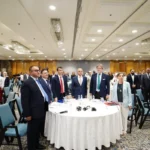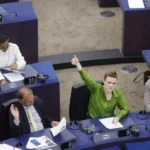The Swiss Trade Union Union and Travail.Suisse warned last week of the challenges of future discussions between Switzerland and the European Union as the Federal Council prepares to define its negotiating mandate
The European question returned in force to the Swiss political scene ten days ago. And the place of unions in the preliminary discussions with a view to new negotiations with the European Union (EU) was called into question last Sunday by the future president of the Foreign Policy Commission Hans-Peter Portmann, liberal-radical national advisor of Zurich. In an interview with Blick, he calls on Parliament to “break the union monopoly and introduce reforms towards a truly liberal social partnership”. He announced that he would address the role of unions within the framework of the commission this Monday, November 13. So what happened to cause such virulence? According to the elected official, the unions made public their opposition to the result of the exploratory discussions with the EU even before the Federal Council officially communicated on the issue, while revealing information on contentious points.
On Monday, November 6, in fact, two days before the government announced its intention to prepare a negotiating mandate with the EU, the two Swiss union umbrella organizations urgently summoned the press to express their serious concerns about the progress of the negotiations. discussions with the European Commission. The presidents of the Swiss Trade Union Union (USS) and Travail.Suisse, Pierre-Yves Maillard and Adrian Wüthrich, as well as Vania Alleva, president of Unia, Matthias Hartwich, president of the SEV, and Daniel Lampart, first secretary of the USS, warned of the fact that after the institutional framework agreement project, which collapsed in 2021, “it is now a liberalization program that is emerging”.
Expenses reimbursed according to country of origin
The unions explained that, as part of the exploratory discussions, the federal administration which led these exchanges had accepted “a reduction in salary protection and a weakening of public service”, as they underlined in a joint press release. It is planned that workers posted from an EU country to Switzerland will no longer receive reimbursement of their expenses according to Swiss collective labor agreements (CCT), but according to the rules in force in their country of origin, as is currently the case in the Union. Foreign employees should pay for their own accommodation and meals. In addition, the application of this regulation would lead to enormous discrimination for Swiss companies. The resumption of European law would substantially weaken wage protection in other areas as well, said Daniel Lampart. Thus, the deposit and the 8-day prior announcement, such as the ban on offering services in Switzerland, which do not exist in the EU, will be called into question. As well as the participation of social partners in the implementation of support measures.
Wage protection: market barriers
“In the European internal market, national wage protections are still suspected of hindering the access of foreign companies to the market. This is why the European Commission and the Court of Justice of the European Union (CJEU) verify whether wage protection meets the principle of proportionality,” notes the first secretary of the USS, further emphasizing that “Switzerland is by far the country that controls wages the most in Europe. Many EU actors and actresses qualify our level of controls as disproportionate.”
Another concern of the unions is the desire to move towards complete liberalization of the electricity market and to authorize access to the rail market for providers like Flixtrain in international passenger traffic and to open up freight transport.
Faced with these projects, the Swiss Trade Union Union and Travail.Suisse are asking the Federal Council to correct these errors. The government must “defend the interests of the population in negotiations with the EU and guarantee the protection of wages and public service”.
Negotiation mandate
Two days after the union press conference, the Federal Council communicated its decision to develop, by the end of the year, a negotiating mandate on the basis of internal work and exploratory discussions carried out since April 2022. This mandate will then be submitted for consultation to the foreign policy committees of the two Chambers of Parliament and the Conference of Cantonal Governments. At the same time, the government announced that discussions with social partners and the cantons would continue on internal measures to protect wages, agreement on electricity.
This article is originally published on evenement.ch






